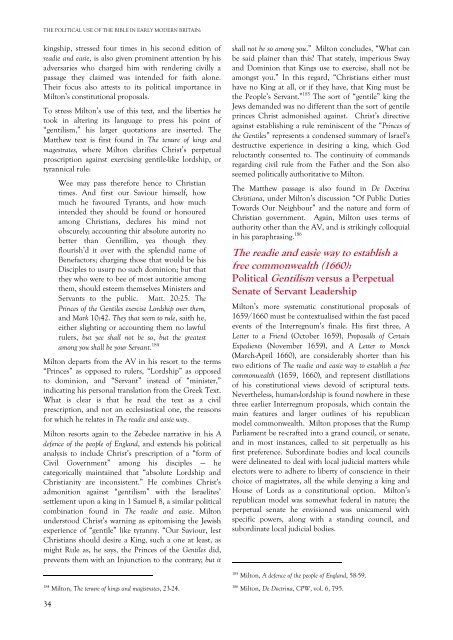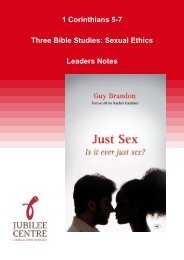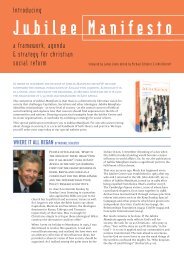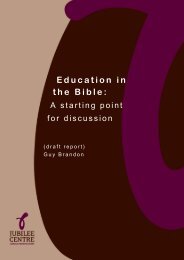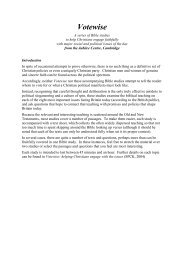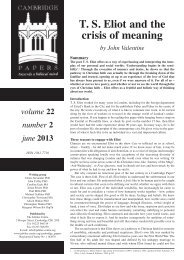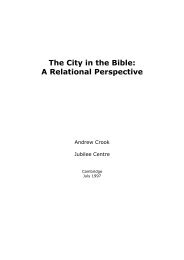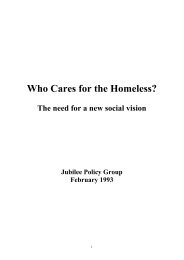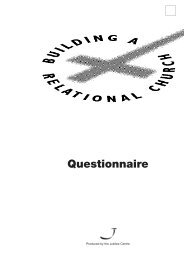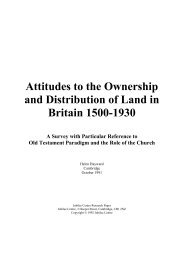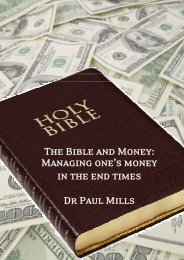Report Template - Jubilee Centre
Report Template - Jubilee Centre
Report Template - Jubilee Centre
You also want an ePaper? Increase the reach of your titles
YUMPU automatically turns print PDFs into web optimized ePapers that Google loves.
THE POLITICAL USE OF THE BIBLE IN EARLY MODERN BRITAIN:<br />
kingship, stressed four times in his second edition of<br />
readie and easie, is also given prominent attention by his<br />
adversaries who charged him with rendering civilly a<br />
passage they claimed was intended for faith alone.<br />
Their focus also attests to its political importance in<br />
Milton’s constitutional proposals.<br />
To stress Milton’s use of this text, and the liberties he<br />
took in altering its language to press his point of<br />
“gentilism,” his larger quotations are inserted. The<br />
Matthew text is first found in The tenure of kings and<br />
magestrates, where Milton clarifies Christ’s perpetual<br />
proscription against exercising gentile-like lordship, or<br />
tyrannical rule:<br />
Wee may pass therefore hence to Christian<br />
times. And first our Saviour himself, how<br />
much he favoured Tyrants, and how much<br />
intended they should be found or honoured<br />
among Christians, declares his mind not<br />
obscurely; accounting thir absolute autority no<br />
better than Gentillim, yea though they<br />
flourish’d it over with the splendid name of<br />
Benefactors; charging those that would be his<br />
Disciples to usurp no such dominion; but that<br />
they who were to bee of most autoritie among<br />
them, should esteem themselves Ministers and<br />
Servants to the public. Matt. 20:25. The<br />
Princes of the Gentiles exercise Lordship over them,<br />
and Mark 10:42. They that seem to rule, saith he,<br />
either slighting or accounting them no lawful<br />
rulers, but yee shall not be so, but the greatest<br />
among you shall be your Servant. 184<br />
Milton departs from the AV in his resort to the terms<br />
“Princes” as opposed to rulers, “Lordship” as opposed<br />
to dominion, and “Servant” instead of “minister,”<br />
indicating his personal translation from the Greek Text.<br />
What is clear is that he read the text as a civil<br />
prescription, and not an ecclesiastical one, the reasons<br />
for which he relates in The readie and easie way.<br />
Milton resorts again to the Zebedee narrative in his A<br />
defence of the people of England, and extends his political<br />
analysis to include Christ’s prescription of a “form of<br />
Civil Government” among his disciples — he<br />
categorically maintained that “absolute Lordship and<br />
Christianity are inconsistent.” He combines Christ’s<br />
admonition against “gentilism” with the Israelites’<br />
settlement upon a king in 1 Samuel 8, a similar political<br />
combination found in The readie and easie. Milton<br />
understood Christ’s warning as epitomising the Jewish<br />
experience of “gentile” like tyranny. “Our Saviour, lest<br />
Christians should desire a King, such a one at least, as<br />
might Rule as, he says, the Princes of the Gentiles did,<br />
prevents them with an Injunction to the contrary; but it<br />
shall not be so among you.” Milton concludes, “What can<br />
be said plainer than this? That stately, imperious Sway<br />
and Dominion that Kings use to exercise, shall not be<br />
amongst you.” In this regard, “Christians either must<br />
have no King at all, or if they have, that King must be<br />
the People’s Servant.” 185 The sort of “gentile” king the<br />
Jews demanded was no different than the sort of gentile<br />
princes Christ admonished against. Christ’s directive<br />
against establishing a rule reminiscent of the “Princes of<br />
the Gentiles” represents a condensed summary of Israel’s<br />
destructive experience in desiring a king, which God<br />
reluctantly consented to. The continuity of commands<br />
regarding civil rule from the Father and the Son also<br />
seemed politically authoritative to Milton.<br />
The Matthew passage is also found in De Doctrina<br />
Christiana, under Milton’s discussion “Of Public Duties<br />
Towards Our Neighbour” and the nature and form of<br />
Christian government. Again, Milton uses terms of<br />
authority other than the AV, and is strikingly colloquial<br />
in his paraphrasing. 186<br />
The readie and easie way to establish a<br />
free commonwealth (1660):<br />
Political Gentilism versus a Perpetual<br />
Senate of Servant Leadership<br />
Milton’s more systematic constitutional proposals of<br />
1659/1660 must be contextualised within the fast paced<br />
events of the Interregnum’s finale. His first three, A<br />
Letter to a Friend (October 1659), Proposalls of Certain<br />
Expedients (November 1659), and A Letter to Monck<br />
(March-April 1660), are considerably shorter than his<br />
two editions of The readie and easie way to establish a free<br />
commonwealth (1659, 1660), and represent distillations<br />
of his constitutional views devoid of scriptural texts.<br />
Nevertheless, human-lordship is found nowhere in these<br />
three earlier Interregnum proposals, which contain the<br />
main features and larger outlines of his republican<br />
model commonwealth. Milton proposes that the Rump<br />
Parliament be re-crafted into a grand council, or senate,<br />
and in most instances, called to sit perpetually as his<br />
first preference. Subordinate bodies and local councils<br />
were delineated to deal with local judicial matters while<br />
electors were to adhere to liberty of conscience in their<br />
choice of magistrates, all the while denying a king and<br />
House of Lords as a constitutional option. Milton’s<br />
republican model was somewhat federal in nature; the<br />
perpetual senate he envisioned was unicameral with<br />
specific powers, along with a standing council, and<br />
subordinate local judicial bodies.<br />
185<br />
Milton, A defence of the people of England, 58-59.<br />
184<br />
Milton, The tenure of kings and magistrates, 23-24.<br />
186<br />
Milton, De Doctrina, CPW, vol. 6, 795.<br />
34


